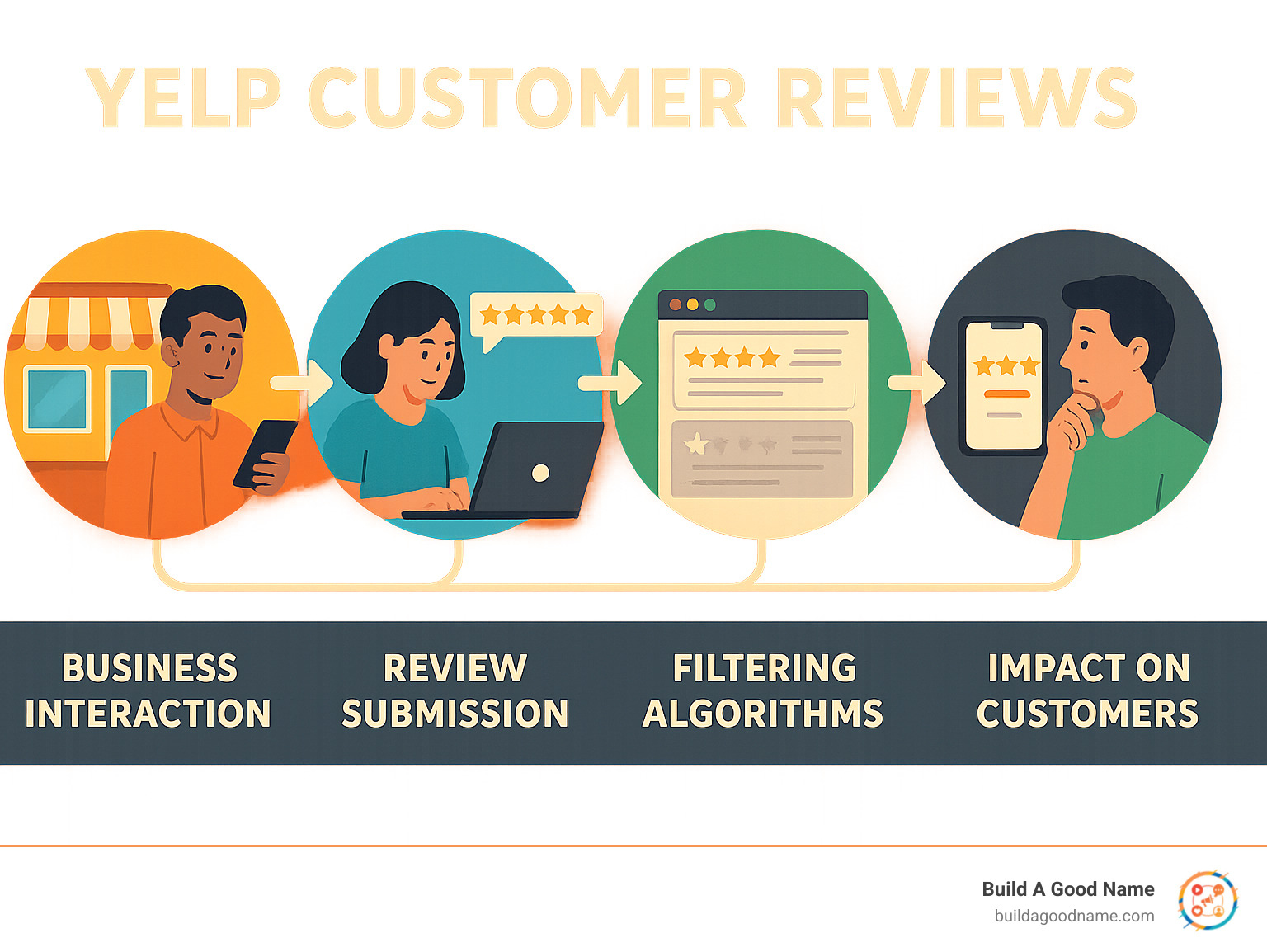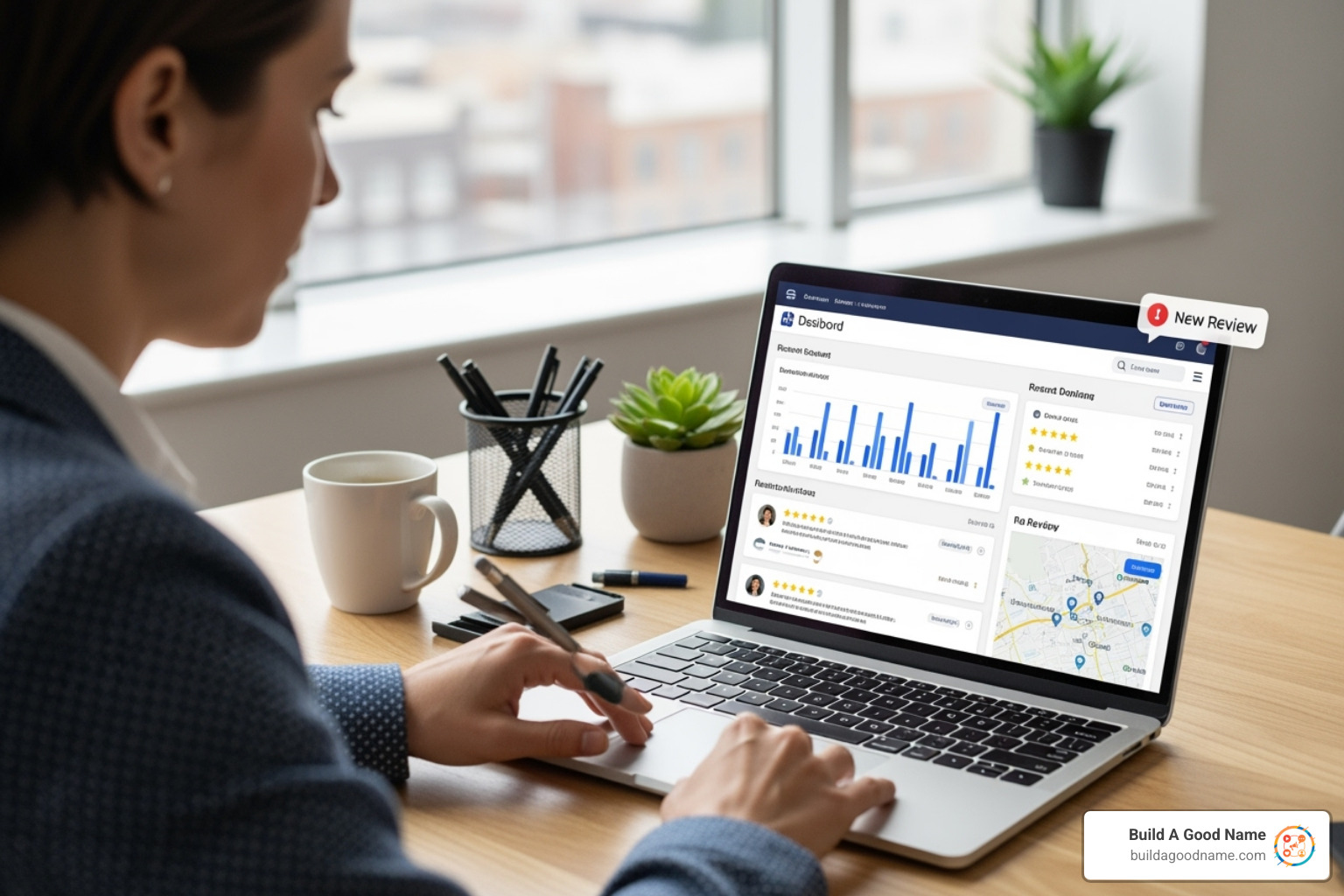Why Understanding Yelp Reviews Matters for Your Business
Yelp customer reviews shape how millions of consumers find and choose local businesses. Yet behind the star ratings lies a complex system that can make or break your business reputation.
Here’s what you need to know about Yelp customer reviews:
- Average Rating: Yelp itself has a 1.2-star rating on other review platforms.
- Common Complaints: Users cite billing issues, misleading ads, and poor customer service.
- Filter System: Reviews are sorted into “recommended” and “not recommended” categories.
- Business Impact: Reviews directly influence purchasing decisions and business success.
- Platform Reliability: Many question the fairness of Yelp’s review filtering.
While Yelp helps consumers, the platform itself faces widespread criticism. One Reddit user captured this irony: “I’m laughing my butt off that yelp has a one star rating. They don’t deserve one star.”
The reality is more nuanced than simple star ratings suggest. Business owners feel caught between needing positive reviews and dealing with a platform they distrust, while consumers rely on these same reviews to find quality services.
Understanding how Yelp’s review system works—from its filtering algorithms to advertising pressures—is crucial for any business owner wanting to build a strong online reputation.

Yelp customer reviews terms you need:
The Impact of Reviews: A Two-Sided Coin
Customer reviews are a two-sided coin. For shoppers, they’re lifesavers. For business owners, they can feel like make-or-break moments.
Yelp customer reviews illustrate this double-edged reality. While millions of consumers rely on them, many business owners are frustrated with the platform. It’s ironic that Yelp itself has a 1.2-star rating—the very system helping others evaluate businesses struggles with its own reputation.
For Consumers: Guiding Purchase Decisions
In the digital world, reviews provide social proof. They act as trust signals—like a friend whispering whether a place is worth your time and money.
We use reviews as decision-making shortcuts. Instead of gambling on an unknown business, we scan real customer experiences to see if the pizza arrived hot or if the plumber was on time.
This user-generated content helps us avoid frustrating experiences. When a customer writes about “inattentive waitstaff” or praises “first-rate service,” they’re helping fellow consumers.
Reviews come from people just like us, trying to spend their money wisely. Learning The Art of Feedback: How to Write a Good Review That Matters helps ensure these experiences are shared effectively.
For Businesses: The Bottom Line

For business owners, reviews directly impact the bottom line. Your online reputation works 24/7, either bringing in customers or sending them to competitors.
For customer acquisition, people look for the best reviews, not just the closest or cheapest service. A business like Regal Plumbing, with a 4.8-star rating and mentions of “prompt, polite, knowledgeable, and efficient” technicians, stands out and gets bookings.
Brand perception can shift quickly. A few negative reviews describing a business as a “scam” can cause lasting damage. The revenue impact is immediate: positive reviews drive sales, while negative ones stop them.
This is why Why Reputation Management Matters for Your Brand is a critical strategy. Building business credibility means actively managing your review presence, responding to feedback, and encouraging happy customers to share their experiences. Reviews are the new, permanent word-of-mouth.
The Complex World of Customer Reviews: Algorithms, Ads, and Allegations
Behind simple star ratings lies a complex world. Digging into how Yelp customer reviews work reveals automated filtering, controversial business models, and ethical questions that puzzle business owners and consumers. Not all reviews are treated equally, and understanding these mechanics is essential for navigating the modern reputation landscape.
The Review Filter: Recommended vs. Not Recommended
Yelp’s automated software sorts Yelp customer reviews into “recommended” and “not recommended” buckets. The “not recommended” reviews are pushed to the bottom where most people never see them.
Yelp states its recommendation software is “automated and applies the same standards to all businesses and reviews without manual override.” It supposedly identifies helpful reviews based on reviewer activity and other factors.
However, many business owners are skeptical. They report suspicious patterns, like a Reddit user’s story of a veterinary hospital advertising with Yelp that had “118 hidden reviews, nearly all one-star.”
The filtering system particularly impacts new users, whose legitimate first reviews often get filtered out. This means genuine customer voices can go unheard.
For businesses, tools like the Review Filtering Tool can help decode which reviews are visible to customers.
The Business Model: Advertising and Allegations of Manipulation

Yelp’s revenue comes mostly from advertising, which is the source of most controversy. The platform earned a C+ rating from the Better Business Bureau after 1,840 complaints in three years.
Business owners frequently report feeling pressured by Yelp’s sales tactics. Stories abound of “free” advertising that turns into immediate charges, or “$900 in free ad clicks” that requires spending $900 first. One owner was charged immediately for a “free month” and was denied a refund.
The most serious allegation is that Yelp manipulates review visibility based on advertising payments. While Yelp denies this, many business owners believe negative reviews become more prominent after they stop advertising.
Canceling Yelp services is another common headache. Despite claims that services can be canceled anytime, many owners report unexpected charges and difficult cancellation processes, feeling trapped.
Understanding these dynamics is crucial for effective Reputation Management and Your Digital Footprint.
Ethical Gray Areas and User Trust
The ethical questions surrounding Yelp customer reviews create a complicated landscape. Yelp often hides behind Section 230 of the Communications Decency Act, which says they’re not responsible for user posts. This means they rarely remove reviews unless they violate specific content guidelines, leaving businesses feeling powerless.
The trust issue runs deep. On other platforms, Yelp itself has a dismal 1.2-star average rating, with users calling it “the worst place to get customer feedback” and “a scam.” This creates a credibility crisis.
This widespread skepticism affects how people trust Yelp customer reviews compared to other sources. Many consumers now view Yelp with the same suspicion as business owners. The platform’s aggressive advertising and mysterious filtering have eroded confidence in its reliability.
For businesses, this means managing your online reputation requires understanding how to steer a platform where the rules aren’t always clear. Learning to Control Your Online Reputation means acknowledging these challenges while still showcasing your business effectively.
Common Themes in Reviews: The Good, The Bad, and The Ugly
In Yelp customer reviews, you’ll notice recurring stories. Understanding these patterns helps consumers spot reliable information and businesses learn what matters to customers.
Understanding Praises and Complaints in Customer Reviews
The sentiment in Yelp customer reviews reveals what makes customers happy versus what frustrates them.
What makes customers rave? Standout reviews almost always mention exceptional customer service. A customer called Sean from iSpring Water Systems “the most helpful person I have ever experienced.” Regal Plumbing’s technicians are praised for being “prompt, polite, knowledgeable, and efficient.”
High-quality products and services are another consistent theme. RPS Solar Pumps is lauded for “first-rate Service and High Quality products,” while Edible Landscaping earned praise for its “plant selection” and for shipping “well-packed Jujube trees.”
Customers also love efficiency and responsiveness, like when Regal Plumbing’s emergency technician arrived “within an hour to provide fast and efficient service.”
Complaints follow predictable patterns. Unresponsiveness and poor communication top the list, with one review citing “unprofessionalism and unresponsiveness.”
Billing issues and misleading offers are also common, especially regarding “free trial” offers that turn into unexpected charges.
Perhaps most damaging is perceived dishonesty or manipulation, such as the belief that platforms hide negative reviews for advertisers, which creates deep distrust.
Real-World Examples and Anecdotes

These themes come alive in the actual stories behind the star ratings.
There’s the construction veteran so impressed by Sean’s technical support that he wrote about “the most helpful person I have ever experienced.” This kind of testimonial carries real weight.
On the flip side, the Family Tree DNA customer who watched their website slow down feared their “money is gone.” This is the terror every customer feels when digital services fail.
The business owner caught in an advertising trap tells another story. After signing up for a “free trial,” they were charged hundreds for leads that “did not convert” and were denied a refund. Another was charged nearly $500 after being told there would be no charges, eventually facing collections.
Most telling is the Reddit user’s veterinary hospital experience: their one-star review was “filtered and not included in the business’s rating.” The fact the hospital was an advertiser raised uncomfortable questions.
These real stories show why Manage Customer Feedback: Best Practices isn’t just about collecting reviews—it’s about creating experiences worth sharing for the right reasons.
A Business Owner’s Playbook for Customer Reviews
Managing your online review presence doesn’t have to be a minefield. With a proactive approach, you can turn Yelp customer reviews into a powerful tool for building trust and growing your business. Think of reviews as public conversations with your customers.
Best Practices for Managing Your Business’s Customer Reviews

Good review management starts with claiming your business page on platforms like Yelp. This gives you control over your profile and the ability to respond to reviews.
Responding to reviews is your most powerful tool. Appreciate positive reviews with a genuine “thank you” to encourage loyalty. For negative reviews, your response is for all future readers. Acknowledge the concern, apologize when appropriate, and offer to resolve the issue privately. The principles in Best Responses to Google Reviews apply everywhere.
Yelp allows you to contact reviewers directly or respond publicly. A private conversation can sometimes turn a frustrated customer into an advocate.
Reviews are also business intelligence. Pay attention to patterns in feedback. Recurring complaints about slow service signal a need to review processes, while consistent praise for an employee highlights a star performer.
Since platforms rarely mediate disputes, your public response is critical for showing potential customers how you handle challenges.
Interacting with Review Platform Business Services
Review platforms offer business services through a dashboard. Understanding these services and their potential pitfalls is crucial for making informed marketing decisions.
Advertising programs promise increased visibility, but many business owners report unexpected charges, misleading promotional offers, and poor return on investment. One owner spent “over $1k on leads with no response or business,” while another was quoted $80 for a customer’s phone number.
If you invest in platform advertising, monitor your spending and track results carefully. Set clear expectations and be ready to cancel if the numbers don’t add up.
Canceling services should be straightforward, but many businesses report difficulties with persistent billing. Document all interactions, especially those related to billing. This is part of Mastering Reputation Management for Service Providers.
The Business Resources provided by platforms can offer insights, but approach case studies with healthy skepticism. Your results may vary. The best strategy is often focusing on excellent service to encourage organic, authentic reviews.
Frequently Asked Questions about Customer Reviews
Navigating online reviews can feel like walking through a minefield, especially when it comes to Yelp customer reviews. Business owners and consumers alike have burning questions about fairness, reliability, and what really happens behind the scenes. Let’s tackle the most common concerns with honest, straightforward answers.
Do online review platforms hide negative reviews for businesses that pay for advertising?
This question strikes at the heart of the biggest controversy surrounding Yelp customer reviews. It’s the elephant in the room that everyone’s talking about, from frustrated business owners to skeptical consumers.
Yelp’s official answer is crystal clear: absolutely not. They maintain that their “recommendation software for reviews is automated and applies the same standards to all businesses and reviews without manual override.” According to Yelp, their algorithm decides which reviews appear as “recommended” or get filtered into “not recommended” based purely on technical factors, completely independent of whether a business pays for advertising.
But here’s where things get complicated. The business community tells a very different story. Countless business owners share eerily similar experiences: negative reviews mysteriously disappear after they start advertising, or suddenly reappear when they stop paying. One Reddit user captured the widespread frustration perfectly, noting how “some users believe Yelp’s algorithm disproportionately hides negative reviews for businesses that advertise with Yelp.”
The anecdotal evidence is overwhelming. Business owners report seeing their competitors’ negative reviews vanish while their own remain visible. A former Yelp employee even admitted on Reddit that while the algorithm is automated, it “needs revision” – a telling acknowledgment of the system’s flaws.
The reality is this: while Yelp officially denies any connection between advertising and review visibility, the sheer volume of similar complaints creates a credibility gap. Whether it’s intentional manipulation or just a poorly designed algorithm, the perception of bias is so widespread that it affects how people view the entire platform.
Can a business have a fake or unfair review removed?
Getting a fake or unfair Yelp customer review removed is like trying to solve a puzzle with half the pieces missing. It’s possible, but the process is frustrating and often unsuccessful.
Yelp operates under Section 230 of the Communications Decency Act, which essentially means they don’t have to play referee in disputes between businesses and reviewers. They’re protected from liability for what users post, so they generally “do not adjudicate disputes between businesses and reviewers.”
If you believe a review violates Yelp’s content guidelines, you can report it using the flag icon or “More Options” menu. Yelp will review content that contains obvious violations like hate speech, personal attacks, or private information. But here’s the catch: they typically “do not remove reviews based solely on word choice or descriptions” unless there’s a clear policy violation.
What this means in practice: feeling a review is “unfair” or disagreeing with a customer’s experience usually isn’t enough for removal. Even reviews from people who weren’t direct customers (like a guest or partner) are generally allowed as long as they don’t misrepresent their identity.
Your best bet? Focus on crafting a thoughtful public response. A professional, empathetic reply often does more good than trying to get the review removed. It shows potential customers that you care about feedback and are willing to address concerns. This approach is much more effective than fighting an uphill battle against Yelp’s removal policies.
Are online reviews reliable compared to other sources?
The reliability of Yelp customer reviews is a loaded question that doesn’t have a simple answer. It’s like asking if the weather forecast is accurate – sometimes it’s spot-on, sometimes it’s way off, and the trust you place in it depends on your past experiences.
On one hand, genuine reviews offer incredible value. When customers share specific details about their experiences – like praising a particular employee who went above and beyond or describing exactly how a service solved their problem – that information is pure gold. These authentic stories provide insights you simply can’t get from traditional advertising or marketing materials.
But here’s where things get murky. The widespread skepticism about Yelp’s filtering system and business practices has seriously damaged trust in the platform. Yelp’s own rating tells the story: a dismal 1.2 stars on Trustpilot compared to Google’s 2.4 stars. That’s a significant trust gap.
Many users have lost faith in Yelp’s reliability, with some explicitly stating that “Google Reviews are more stable and reliable than Yelp.” The constant complaints about hidden reviews, misleading advertising offers, and difficult cancellation processes have created a cloud of doubt over the entire platform.
The bottom line for consumers: treat online reviews as one piece of the puzzle, not the whole picture. Look at patterns across multiple platforms rather than focusing on individual reviews. Read beyond the star ratings to understand the actual experiences people describe.
For businesses: focus on building authentic relationships with customers and encouraging reviews across various platforms. Don’t put all your eggs in one basket, especially when that basket has trust issues.
The key is approaching reviews with a critical eye while still recognizing their value as a window into real customer experiences. They’re a useful tool, but like any tool, they work best when used wisely.
Conclusion: Taking Control of Your Online Narrative
The world of Yelp customer reviews tells a fascinating story of modern business. On one side, millions of customers rely on these reviews to make smart choices about where to spend their money. On the other side, business owners wrestle with a platform that can make or break their reputation—often in ways that feel unfair or confusing.
Reviews have real power. They guide purchasing decisions, build trust between strangers, and can turn a small local business into a community favorite overnight. But as we’ve seen, the system behind these reviews is far from perfect. With Yelp’s own 1.2-star rating and countless complaints about hidden reviews and aggressive sales tactics, it’s clear that relying on any single platform is risky business.
The key is taking control rather than hoping for the best. Smart business owners understand that reputation management isn’t about gaming the system—it’s about consistently delivering excellent service and making sure your customers’ voices are heard. This means responding thoughtfully to feedback, learning from complaints, and actively encouraging satisfied customers to share their experiences.
Your online reputation is too important to leave to chance. The filtering algorithms, advertising pressures, and platform politics we’ve explored show why businesses need a comprehensive approach to managing their digital presence. It’s not enough to simply hope for good reviews; you need systems in place to collect feedback, respond appropriately, and showcase your best customer experiences.
At Build A Good Name, we’ve seen how the right approach can transform a business’s online presence. Our AI-powered solutions help local businesses steer the complex world of customer reviews without getting caught up in the politics and pitfalls of individual platforms. We focus on what matters most: helping you build genuine relationships with customers and ensuring their positive experiences shine through online.
The landscape of Yelp customer reviews and online reputation management will continue evolving. But the fundamentals remain the same: excellent service, genuine customer care, and proactive reputation management will always win in the long run.
Ready to take control of your online story? Explore our Digital Reputation Management strategies and find how we can help you Boost Your Online Presence with Reputation Management. Your customers are talking about you online—make sure they’re saying the right things.



